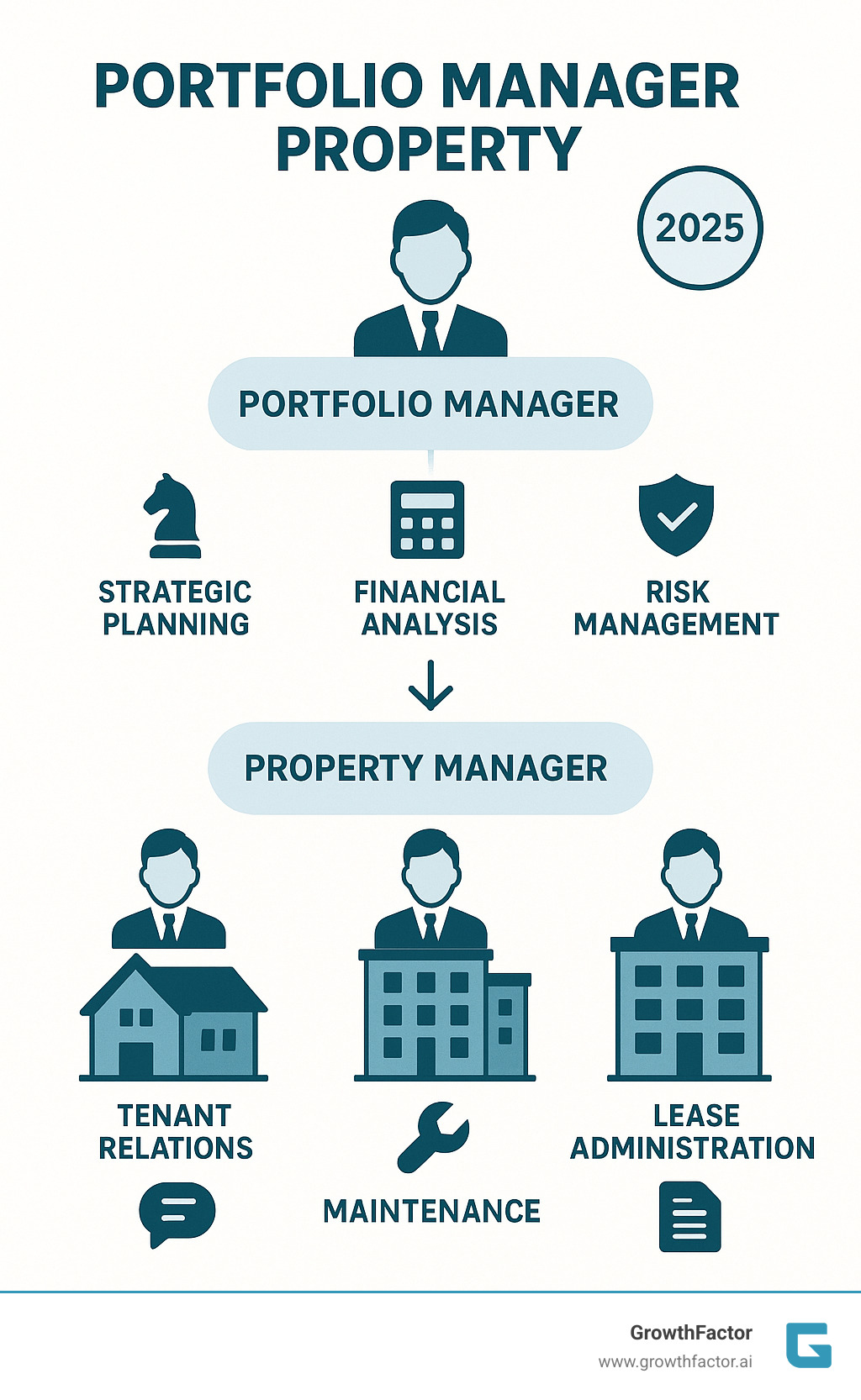Senior Property Portfolio Manager Secrets – Revealed!
Written by: Clyde Christian Anderson
Why Property Portfolio Management is the Key to Real Estate Success

Portfolio manager property refers to the strategic oversight and management of multiple real estate assets to maximize investment returns and minimize risk. It's a discipline that moves beyond the day-to-day tasks of traditional property management, which typically focuses on a single building. Instead, portfolio management adopts a high-level, holistic approach to optimize entire collections of properties, treating them as a single, cohesive investment vehicle.
Key aspects of portfolio manager property include:
- Strategic Focus: This involves more than just managing properties; it's about curating a collection of assets that work together to achieve specific, long-term investor goals. A portfolio manager aligns every decision with the overarching investment thesis, whether it's aggressive growth, stable income generation, or a balanced approach.
- Financial Optimization: At its core, this is about maximizing returns. Portfolio managers dive deep into financial metrics, analyzing everything from Net Operating Income (NOI) and capitalization rates to Internal Rate of Return (IRR) and cash-on-cash return. They use this data to guide asset allocation, identifying which properties to hold, sell, or reinvest in.
- Risk Management: A key role is to build a resilient portfolio that can withstand market fluctuations. This is achieved through strategic diversification—not just across different geographic locations to mitigate regional downturns, but also across various property types (e.g., retail, industrial, residential) and tenant profiles to spread risk effectively.
- Investment Decisions: Portfolio managers are the decision-makers. They spearhead the process of acquiring new properties that fit the portfolio's strategy and identify the optimal time to dispose of assets that are underperforming or have reached their peak value. They also oversee major capital improvements, deciding where to invest funds to generate the highest possible return.
- Performance Monitoring: Continuous monitoring is crucial. This involves tracking key performance indicators (KPIs) like ROI, cash flow, occupancy rates, and appreciation across all assets. By constantly analyzing market trends and benchmarking performance, managers can make proactive adjustments to keep the portfolio on track.
The demand for skilled portfolio managers is surging. With an average salary of $113,505 and the portfolio management market projected to reach $11.4 billion by 2027, this career path offers significant opportunities for real estate professionals who can blend financial acumen with strategic foresight.
The role differs dramatically from traditional property management:
While a property manager is focused on the operational health of a single asset—handling tenant relations, collecting rent, and scheduling maintenance—a portfolio manager operates at the strategic level. They are less concerned with a leaky faucet in one unit and more concerned with how regional economic trends might impact the occupancy rates across a dozen properties. They analyze market data, develop long-term financial models, and make the critical investment decisions that shape the future of the entire portfolio.
Modern portfolio managers increasingly rely on data-driven insights to stay competitive. As one industry expert noted: "Efficient property portfolio management can generate 3X faster ROI" when powered by the right technology and strategic approach.
Beyond traditional financial analysis, top-performing portfolio managers now integrate environmental, social, and governance (ESG) metrics into their decision-making. Evaluating a building’s energy efficiency scores, reviewing resilience to climate risk, and understanding community impact are fast becoming part of the standard due-diligence checklist. Investors increasingly reward portfolios that demonstrate measurable sustainability gains, so incorporating ESG criteria is quickly moving from a “nice-to-have” to a core requirement for any forward-thinking portfolio manager property professional. Embedding these considerations early can open up preferential financing, attract premium tenants, and safeguard long-term asset value.
I'm Clyde Christian Anderson, CEO of GrowthFactor.ai, and I've spent over a decade working in retail real estate, from evaluating individual sites to managing multi-property portfolios. My experience in portfolio manager property strategies has shown me how the right approach can transform investment outcomes and accelerate business growth.

Portfolio manager property terms made easy:
- commercial real estate portfolio management
- commercial real estate portfolio management software
- lease abstraction automation
The Strategic Difference: Portfolio Manager vs. Property Manager
When we talk about managing real estate, it's easy to get lost in the jargon. But understanding the core distinction between a Property Portfolio Manager and a Property Manager is crucial for anyone in the real estate investment world.
Think of it like this: a Property Manager is the dedicated chef for one fantastic restaurant, ensuring every dish is perfect, the kitchen runs smoothly, and the customers are happy. A portfolio manager property professional, on the other hand, is the CEO of a restaurant group, deciding which new restaurants to open, which ones to sell, how to optimize the entire chain's profitability, and where to source the best ingredients for all of them.
| Feature | Property Portfolio Manager | Property Manager |
|---|---|---|
| Focus | Strategic, portfolio-wide decisions | Operational, single-property tasks |
| Scope | Multiple properties across markets | Individual property management |
| Primary Goals | ROI optimization, risk management | Tenant satisfaction, operational efficiency |
| Key Activities | Investment analysis, asset allocation | Rent collection, maintenance coordination |
| Perspective | Macro-view of market trends | Micro-view of daily operations |
| Financial Role | Portfolio performance and growth | Property-level budgeting and expenses |
The difference between these roles is like comparing a conductor leading an entire orchestra versus a virtuoso perfecting their solo performance. Both are essential, but they operate at completely different levels of the investment lifecycle.
What is a Property Portfolio Manager?
A Property Portfolio Manager operates as the strategic mastermind behind multiple real estate investments. They're the ones asking the big questions: Which markets show the most potential for growth over the next decade? Is now the right time to divest from our Class B office assets and pivot toward logistics and industrial properties? How can we refinance a portion of the portfolio to free up capital for a new acquisition without over-leveraging our position?
Strategic oversight is their bread and butter. While others focus on individual properties, portfolio managers see the forest, not just the trees. They analyze investment performance across all assets, making decisions about asset allocation that can make or break an investment strategy. This involves sophisticated financial modeling and forecasting to project future performance and identify opportunities for value creation.
Risk management becomes an art form at this level. A skilled portfolio manager doesn't just manage one property's risks – they balance risks across multiple properties, markets, and asset types. They might balance a high-risk, high-reward development project in one city with a portfolio of stable, income-producing retail centers in another. They're constantly working toward financial goals that encompass the entire investment portfolio, reporting progress and strategy adjustments to investors and stakeholders.
When you're dealing with multiple properties, the complexity multiplies exponentially. That's where portfolio management expertise becomes invaluable. These professionals understand how different assets interact with each other and how macroeconomic shifts—like interest rate changes or new regulations—affect the whole portfolio, not just individual properties.
The role requires a deep understanding of market dynamics and the ability to make data-driven decisions that optimize returns. For those interested in diving deeper into this field, portfolio property management offers comprehensive insights into modern strategies.
What is a Property Manager
Property Managers are the boots-on-the-ground heroes of real estate operations. They're the ones who make sure the day-to-day magic happens smoothly, ensuring assets are well-maintained and tenants are satisfied. Their work is the foundation upon which a portfolio's success is built.
Tenant relations are their specialty. They are the primary point of contact for tenants, skillfully handling everything from initial screenings and lease signings to addressing noise complaints and processing move-outs. A great property manager fosters a positive community, which leads to higher retention rates and fewer costly vacancies.
Rent collection might sound simple, but it requires a delicate balance of firmness and understanding. Property managers implement and enforce rent collection policies, manage delinquencies, and handle the sensitive process of eviction when necessary, all while maintaining professionalism and adhering to local regulations.
Maintenance coordination is where their organizational skills really shine. They conduct regular property inspections, manage preventative maintenance schedules to prolong the life of the building's systems, and respond to emergency repair requests. They cultivate a network of reliable vendors and contractors, ensuring quality work is done on time and within budget.
Lease administration involves all the paperwork and legal details that make rental relationships work smoothly. They handle lease renewals, track critical dates, manage security deposits, and ensure all property operations are compliant with local, state, and federal laws. This meticulous attention to detail prevents costly legal issues and financial penalties.
Their single-asset focus allows them to become experts on their specific properties. They know every quirk, every maintenance issue, and every tenant by name. This focused approach drives operational efficiency in ways that broader management simply can't match. The detailed operational and financial data they collect—from maintenance costs to tenant feedback—is vital information that they feed up to the portfolio manager, who uses it to inform their high-level strategic decisions.
Citations
The human algorithm
Request Your demo
Schedule meeting
Or submit your information below and we'll be in touch to schedule.


